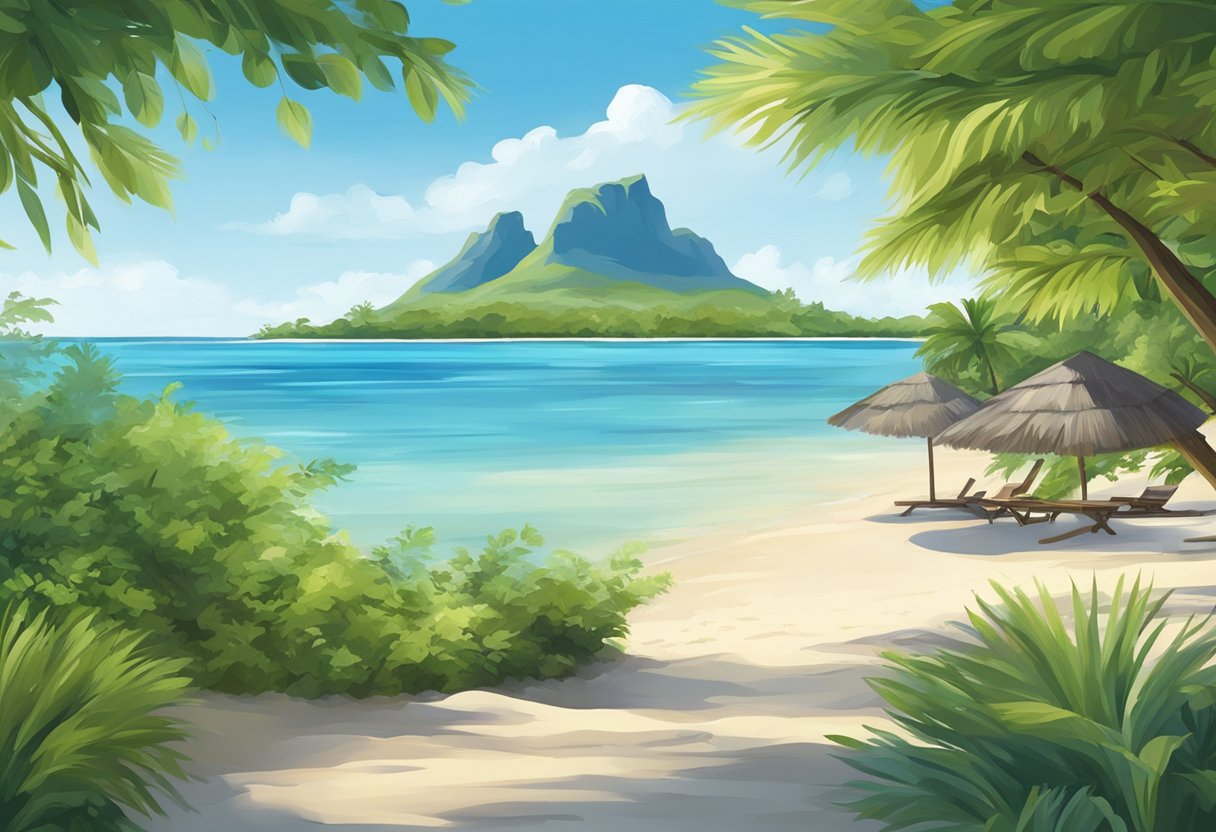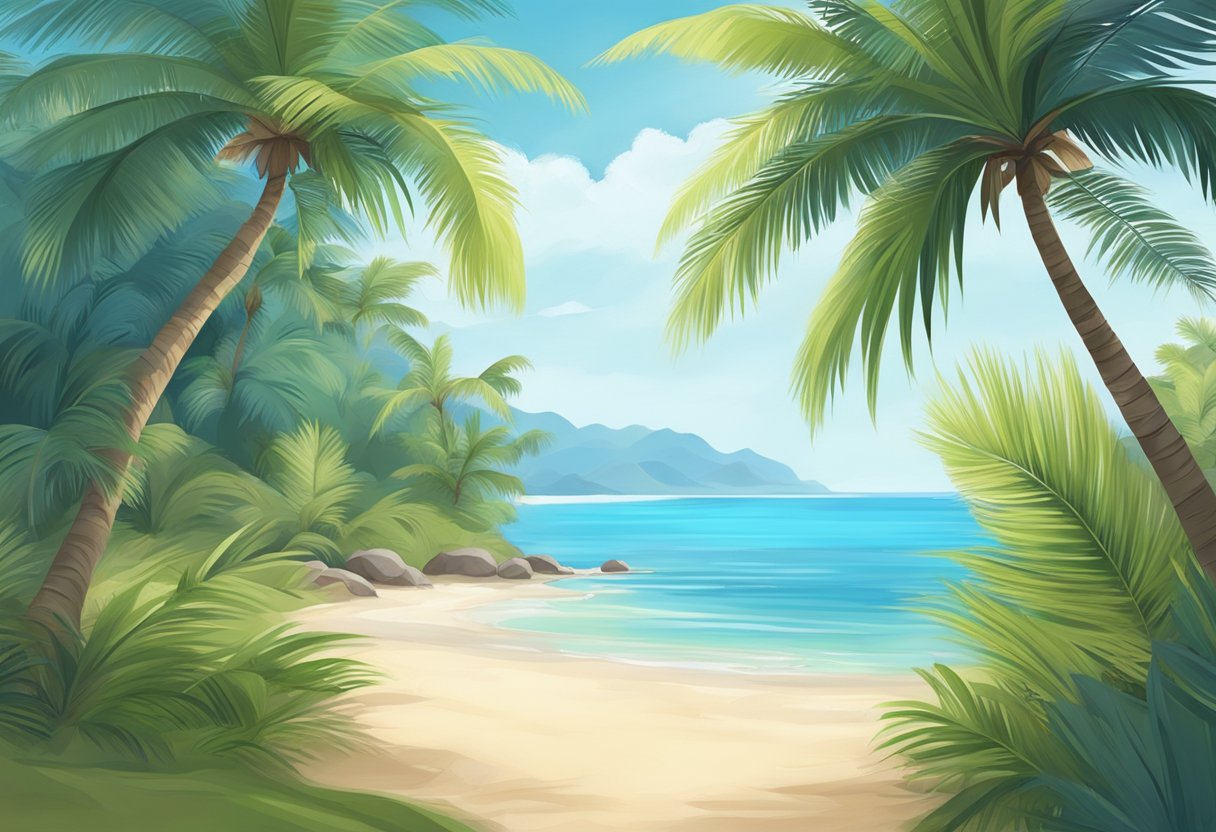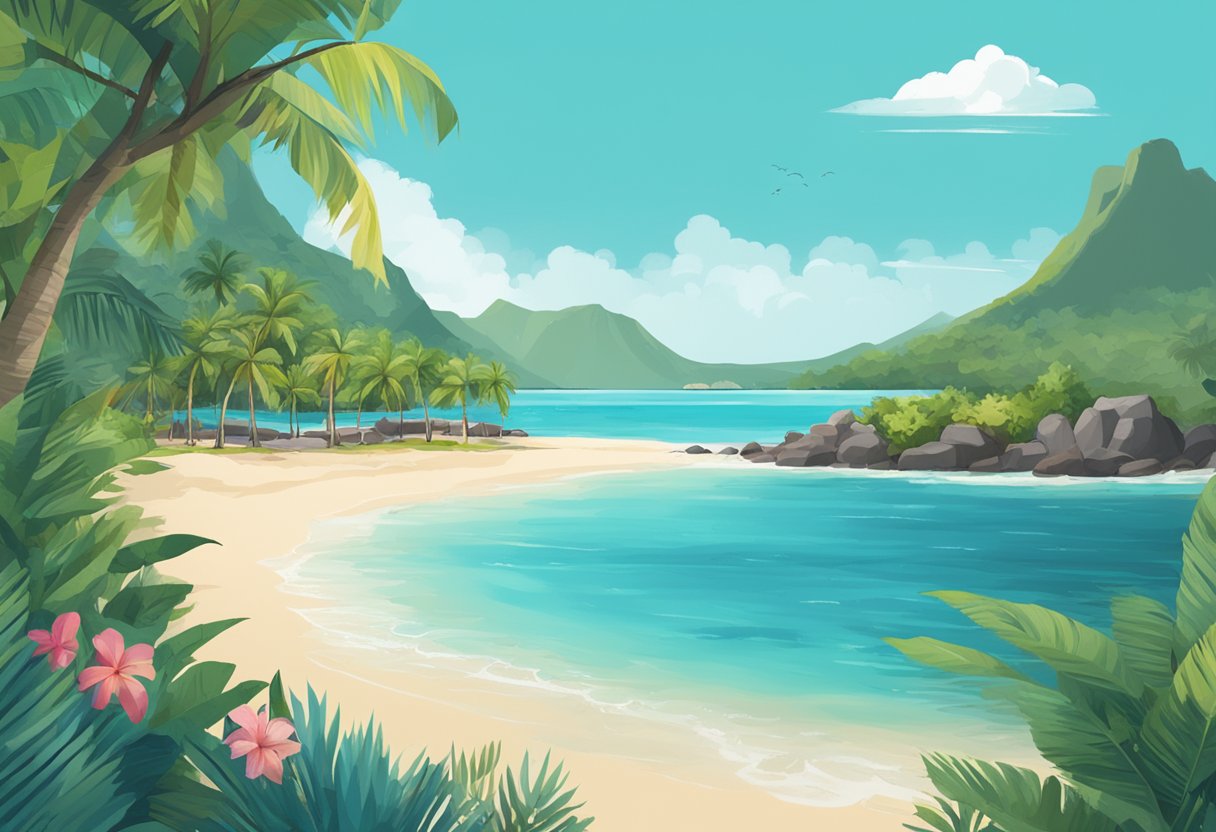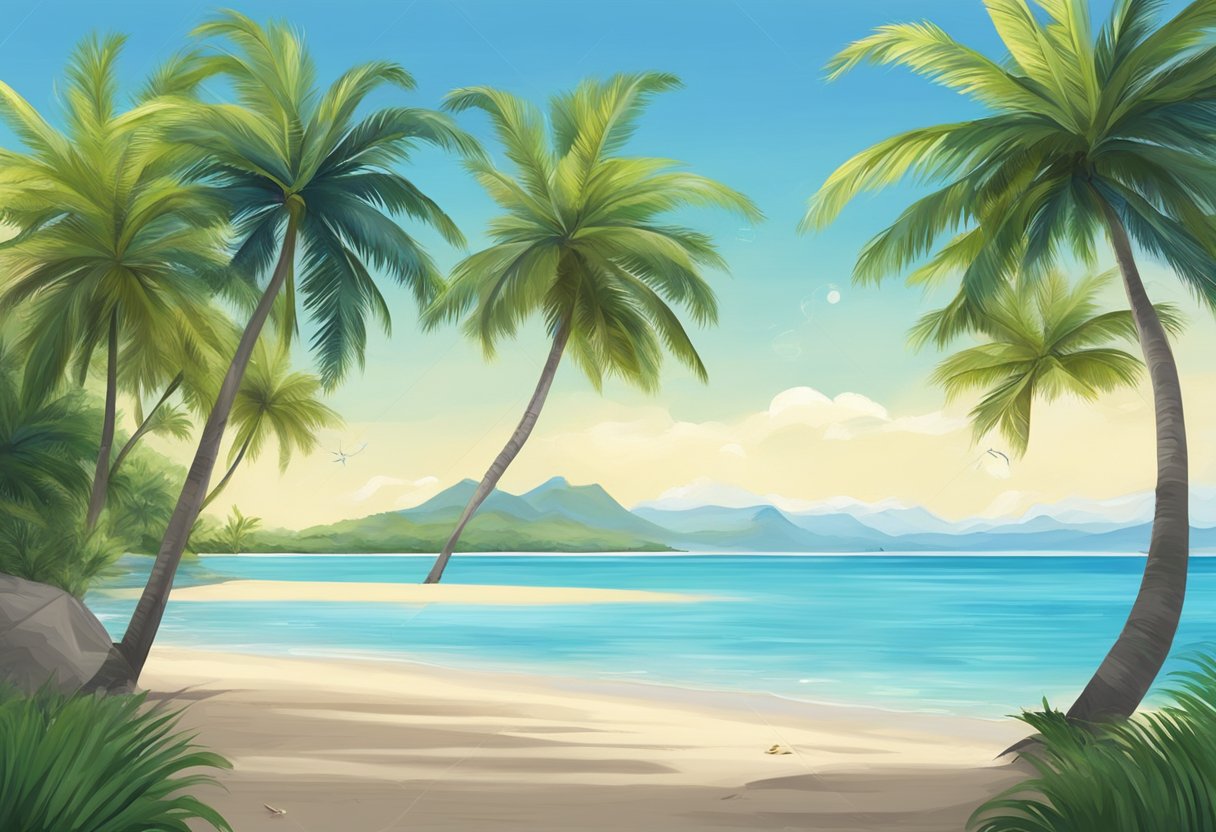Traveling to a new destination brings up many questions, and safety is invariably at the top of the list. Mauritius is known for its stunning beaches, turquoise waters, and lush landscape. But beyond its picturesque scenes, Mauritius is also known for safety. With its reputation as one of the safest countries in Africa, Mauritius has become a sought-after destination for tourists seeking both adventure and relaxation in a secure environment.

Feeling safe is one of the most important things for any travel experience. In Mauritius, the main concern tends is petty theft, which is often easily preventable by exercising standard precautions such as keeping an eye on our belongings and using common sense, particularly in busy areas. Personally I’m a big fan of using a an anti pick pocketing pouch to avoid such issues
Public transport and taxis pose a low risk, allowing us the freedom to explore the island with a sense of assurance.
As you prepare for your journey to Mauritius, it is important to stay informed about the latest travel advisories and local laws. We look to reliable resources for updated information regarding travel safety .
General Safety Overview

Mauritius is considered to be one of the safest countries in Africa. The crime rate in Mauritius is low. While instances of petty theft do occur, such as pickpocketing or bag-snatching, they are not rampant. We advise tourists to maintain vigilance with their belongings, especially in crowded areas.
Is Mauritius Safe for Solo Female Travelers
For women travelers, Mauritius is generally considered safe. However, it’s always prudent to take standard precautions like avoiding isolated areas at night and being cautious when accepting drinks from strangers. Take normal precautions as you would anywhere.
| Crime | Prevalence | Recommended Precautions |
|---|---|---|
| Petty Theft | Low | Guard personal belongings |
| Violent Crime | Very Low | Stay in public spaces |
| Scams | Low | Be wary of unsolicited offers |
To bolster your personal safety, we urge you to:
- Keep valuables out of sight and secure.
- Use licensed taxis or reputable transportation.
- Remain attentive in tourist-heavy areas.
Rest assured, with common sense and basic safety practices, your experience in Mauritius should remain largely trouble-free. For the most current safety guidelines, it’s beneficial to look at insights from trusted travel advisories.
Travel Precautions and Health

When planning your trip to Mauritius, it’s crucial to address health and safety measures to ensure a pleasant journey. Taking the right precautions can protect against potential health risks and provide peace of mind.
Vaccinations and Health Risks
Before traveling, it’s advisable to consult with your healthcare provider to get the necessary vaccinations. Yellow fever vaccinations are required if you’re coming from a region where it’s endemic. We recommend checking for Dengue Fever and Chikungunya as well, as these are mosquito-borne illnesses known to occur in Mauritius. Preventative measures such as mosquito repellent and appropriate clothing can reduce the risk of these diseases.
- Vaccinations:
- Yellow fever (if traveling from an endemic country).
- Routine vaccines (Measles, Mumps, Rubella, etc.).
- Hepatitis A and Typhoid (recommended for most travelers).
- Health Risks:
- Chikungunya and Dengue Fever (use insect repellent, wear long sleeves and pants).
Travel Insurance Essentials
Investing in travel insurance is essential for covering unexpected medical expenses and losses due to accidents or medical emergencies. Ensure your policy covers medical evacuation and activities you plan to engage in. We suggest ensuring coverage for trip cancellation and lost luggage for additional security.
- Insurance Coverage to Consider:
- Medical treatment and hospitalization.
- Emergency medical evacuation.
- Trip cancellation and interruption.
- Lost or stolen baggage.
Emergency Services
In case of an emergency, it’s important to know how to get help. Mauritius has a reliable ambulance service, and its hospitals are equipped to handle a variety of medical situations. Save local emergency numbers on your phone prior to arrival and if you’re staying at a hotel, familiarize yourself with their procedure for handling emergencies.
- Emergency Contacts:
- Police: 999
- Ambulance: 114
- Fire: 115
Considering these aspects of travel precautions and health before you leave for Mauritius can safeguard our trip, allowing us to enjoy the island’s beauty with confidence and security.
Natural Hazards and Climate
Mauritius is a beautiful island nation that, like any tropical paradise, experiences its own set of natural hazards stemming from its climate. We must be cognizant of the risks posed by cyclones and other weather-related natural disasters, which are intrinsic to the region.
Cyclone Season Preparedness
Mauritius encounters cyclone season from November to May, with the peak period spanning from January to March. During this time, it is crucial for us to monitor weather forecasts and heed advisories issued by the Mauritius Meteorological Service. Preparing a survival kit including essentials such as non-perishable food, water, and medical supplies is vital for our safety. Equally important is securing property by checking the integrity of roofs and windows, and knowing the location of nearby shelters.
- Survival Kit Essentials:
- Non-perishable food
- Water supply for several days
- First aid kit, medications
- Flashlights and extra batteries
- Important documents sealed in waterproof containers
- Property Safety Checklist:
- Inspect roof and windows for damage
- Clear gutters and drains
- Trim trees and remove dead branches
- Secure loose items that could become airborne
- Know your nearest cyclone shelter location
Dealing with Humidity and Heat
Mauritius has a tropical climate, resulting in high humidity and heat, especially during the summer months from November to April. It is imperative for us to stay hydrated and wear light, breathable clothing. Staying indoors during peak heat hours can help prevent heat-related illnesses. Our homes should be equipped with fans or air conditioning to manage indoor temperatures effectively.
- Tips for Staying Cool:
- Drink plenty of fluids – aim for 2-3 liters per day
- Wear light-colored, loose-fitting clothing
- Stay indoors between 10 am and 3 pm if possible
- Use fans or air conditioning to cool down spaces
By proactively preparing for natural hazards and being mindful of our climate’s challenges, we can help ensure our safety and continue to enjoy all that Mauritius has to offer.
Legal and Cultural Considerations
When visiting Mauritius, it’s essential for us to respect and adhere to local legal frameworks and cultural norms. Understanding the diversity of laws and regulations can ensure a trouble-free journey.
Understanding Local Laws
In Mauritius, legal systems reflect a blend of French civil law and British common law. It is imperative that we acquaint ourselves with local legislation to avoid inadvertent offenses. Local authorities are vigilant and expect compliance with the law. Behaviors considered minor infractions abroad may carry severe consequences in Mauritius.
LGBT+ Travel Advice
Although attitudes are evolving, we should be aware that same-sex sexual activity was decriminalized in Mauritius. However, discrimination based on sexual orientation can still occur. In public, discretion is advised for LGBT+ travelers as the societal acceptance levels can vary considerably, especially in rural areas.
Drug Regulations and Penalties
Mauritius enforces strict drug laws, and there is zero tolerance for the use or trafficking of illegal drugs. Penalties for drug-related offenses are severe and can lead to long prison sentences. We must take care not to carry any substances that could be construed as narcotics, and prescription medications should be accompanied by a doctor’s note.
Transportation and Getting Around
When traveling to Mauritius, we find a variety of options for transportation that provide access to the island’s beautiful landscapes and cultural sites. Our safety and convenience are paramount, so understanding how to navigate public transport services, taxis, and rental cars is essential.
Public Transport Services
Mauritius offers a network of public buses that cover the island extensively. Buses are an affordable and popular means of transport for both locals and tourists. The main bus stations are located in major towns, with schedules and routes available online or at the stations. There are two types of bus services to choose from: standard and express. The express buses are faster and slightly more expensive but still very reasonable.
- Standard service: Cheaper, with more stops
- Express service: Higher fare, fewer stops
When using public transport, we recommend carrying change to pay for tickets, as drivers may not have sufficient change for larger notes.
Taxi Usage and Safety
Taxis are a convenient option for getting around Mauritius, especially for shorter trips or when public transport is not available. Always look for licensed taxi drivers who display their identification clearly in the vehicle. To ensure our safety and avoid overpaying, we should agree on the fare in advance or ensure the meter is used. It’s also useful to know that taxis can be more expensive than other forms of transport, but they offer the comfort and privacy some of us may prefer.
- Confirm fare before departing
- Use licensed taxis with visible identification
Car Rental and Road Conditions
Renting a car allows us the freedom to explore Mauritius at our own pace. Reputable car rental agencies can be found at the airport as well as in major tourist areas. Driving in Mauritius is on the left-hand side, and while roads are generally in good condition, we should be mindful of occasional narrow or winding roads, especially in rural areas. Familiarizing ourselves with local road safety rules will enhance our driving experience.
- Drive on the left
- Be cautious of narrow and winding roads
We’ll want to ensure that the rental vehicle is in good condition and that we’re comfortable with the local driving style before setting out. Always carry a copy of our rental agreement and driving license when driving.
Financial and Practical Tips

When traveling to Mauritius, it’s essential we manage our finances efficiently and understand the local regulations to ensure a smooth experience. From the currency you’ll use to payment methods and communication options, we’ve covered the crucial details below.
Currency and Payment Methods
The official currency of Mauritius is the Mauritian Rupee (MUR). For our daily transactions, it’s recommended to have some local currency on hand, especially in smaller shops and for public transport, which may not accept credit cards. We can exchange money at banks, hotels, and authorized dealers. Credit cards like Visa and Mastercard are widely accepted, particularly in tourist areas and larger establishments. ATMs are readily available, allowing us to withdraw cash as needed. When using a credit card, make sure to check for any international transaction fees that may apply.
Communication and Connectivity
Staying connected is vital, and in Mauritius, we can easily purchase a local SIM card for mobile data and calls, which is usually more cost-effective than roaming with our home network. We can buy these at the airport, phone stores, or sometimes online. For mail and delivery services, the Mauritius Post is reliable, and there are also international courier services for more urgent deliveries. Wi-Fi access is common in hotels and many cafes, which can be handy for communication via online platforms.
Proof of Sufficient Funds and Customs
Upon entering Mauritius, we may be asked to show proof of sufficient funds to support our stay. This might include recent bank statements, confirmed accommodation bookings, or return tickets. Knowing Mauritius’s customs regulations is paramount in avoiding any issues. Goods like cigarettes, alcohol, and perfume have specific allowance limits we should not exceed. Always declare any items of value to customs to prevent misunderstandings or delays. This preparedness ensures that our entry and exit from the island are as smooth as our stay.
Accommodation Security
When we travel, ensuring the security of our accommodation is crucial, especially in Mauritius where we want to relax without worrying about our belongings. Theft can happen anywhere, but taking specific steps can significantly lessen the risk, particularly in hotels and resorts.
Preventing Theft in Hotels and Resorts
First and foremost, choose accommodations wisely. Opt for establishments that are licensed by the Tourism Authority, as they must comply with rigorous security standards. Upon arrival, we should always make use of the safety deposit boxes provided by the hotel to store our passports, money, and other valuables. It’s better not to leave any tempting items in plain sight in our hotel room, as even the most reputable establishments can have cases of petty theft.
Additionally, we need to maintain vigilance in common areas. Bags and personal items should never be left unattended, even in the perceived safety of the hotel lobby or dining area. A good practice is to keep a close watch on our belongings and use hotel facilities such as lockers when available.
Moreover, many hotels now equip their rooms with electronic safes. We should ensure that the safe is properly functioning before use and that it is secured to the structure of the building— not simply placed in a wardrobe. If there is any doubt about security features, we must contact hotel management immediately.
Here’s a quick checklist for securing valuables in hotel accommodations:
- Immediately upon check-in:
- Use the safety deposit box provided.
- Check that the safe is bolted down and functional.
- In the room:
- Keep valuables locked up at all times.
- Ensure all windows and doors are locked when leaving the room.
- In the hotel’s public spaces:
- Keep personal items within view.
- Use lockers provided by the hotel, especially when using amenities like gyms or pools.
Remember, the key to a peaceful stay is diligence in safeguarding our possessions, so we can focus on enjoying the picturesque beauty of Mauritius.
Beach and Water Safety
When visiting Mauritius, our beach and water experiences are a crucial element of the journey. We ensure that our activities are conducted with safety as a priority. In the midst of the Indian Ocean, the island’s waters are inviting, but we must be aware of certain risks and take appropriate measures to protect ourselves.
Identifying Risky Marine Life
Mauritius’s marine environment is rich and diverse, necessitating our knowledge of local marine life, especially when it comes to species that could pose a danger. Notably, stonefish, one of the world’s most venomous fish, resides in the shallow waters of the Indian Ocean. To protect ourselves, we should:
- Always wear water shoes while walking in shallow water.
- Look for posted warning signs regarding potentially dangerous marine life.
- Never touch or disturb marine creatures, as some may be hidden or camouflaged.
Safe Diving and Adventure Activities
Our enthusiasm for adventure activities in Mauritius’ waters is met with a commitment to safety. Engaging in any diving or water sports necessitates:
- Ensuring that the provider has valid certifications and adheres to safety standards.
- We confirm that insurance is in place to cover potential risks associated with adventure activities.
- Being briefed on and following safety procedures and emergency protocols is a must for us.
- Acknowledging our own skill levels and avoiding overestimation when participating in water-based activities.
By being informed and taking precautions, we can make the most of our time on Mauritius’s beautiful beaches and enjoy the sea safely.
Globe-trotting with a flair for the fearless, Sierra Blake crafts vivid tales and insider tips from the world’s hidden corners, inspiring wanderlust in the heart of every reader.

Leave a Reply